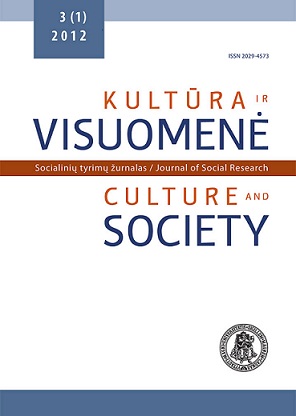Nations and Silences: Specters of Subaltern Space
Nations and Silences: Specters of Subaltern Space
Author(s): Šarūnas PaunksnisSubject(s): Cultural Essay, Political Essay, Societal Essay
Published by: Vytauto Didžiojo Universitetas
Keywords: nationalism; the subaltern; third space; Deepa Mehta; India; nacionalizmas; subalternas; trečioji erdvė; Deepa Mehta; Indija
Summary/Abstract: Šis straipsnis analizuoja pirminį nacionalizmo raidos etapą – tautos laiko ir erdvės formavimą, kuris padeda pagrindą tautos savęs suvokimui. analizuojamas indijos atvejis, žvelgiant į laikmetį prieš nepriklausomybę, ir kalbama apie erdvę, kuri jau nebėra tradicinė, tačiau dar ir ne moderni. tai erdvė, išstumta iš aktyvaus nacionalizmo diskurso, bet jos buvimas yra būtinas diskursui pasąmonės lygmeniu. išeities tašku imama homi K. Bhabha trečiosios erdvės teorija ir modifikuojama taip, kad atveria galimybę pažvelgti į erdvės formaciją prieš susiformuojant trečiąjai (hibridinei) erdvei. Straipsnio tikslas – atskleisti nacionalistinės ideologijos vykdomą visuomeninių grupių subalternizaciją, kaip, viena vertus, privalomą tautos tapsmo elementą, kita vertus, atskleidžiančią tos ideologijos ambivalentiškumą deklaruojamo idealizmo ir realybės akivaizdoje. Šie procesai nagrinėjami pasitelkus indų kilmės Kanados režisierės Deepa mehta 2005 metų filmą „Vanduo“, kuris labai griežtai kritikuoja deklaratyvią nacionalizmo emancipaciją ir nacionalizmo kaip ideologijos destruktyvumą. Straipsnis atveria tai, kaip nacionalizmas koduoja praeitį ir nustato vaidmenis savo subjektams, ypač subalternams. analizuojant šį pirminį nacionalizmo etapą, galima kurti nacionalizmo, kaip giliai dviprasmiškos ideologijos, kritikos strategiją. This article analyzes the initial steps in nationalist project in India – the creation of national space and time, which help to lay foundations of a Nation. What is being analyzed here in the case of India prior the independence, and the space which is not a traditional one, but not modern either. This space is displaced from the active nationalist discourse, but at the same time it is needed on the unconscious level. Homi K. Bhabha’s Third space theory can help grasping the spatial configurations of nationalist space, and the effects of nationalist imagination on the subaltern, provided that such space is not a hybrid one. It can be called a non-space, located in no-time. Deepa Mehta’s film “Water” is taken as providing a critique of nationalist subalternization of society. The aim of the article is to show the subalternization process as on the one hand necessary for the forging of a nation, and on the other – as demonstrating the ambivalence of this ideology in the face of idealism and reality. The article shows how nationalism encodes the past and gives roles to its subject, especially the subaltern subjects. In analyzing this initial step of nationalism it is possible to create a strategy for the critique of this deeply ambiguous ideology.
Journal: Kultūra ir visuomenė: socialinių tyrimų žurnalas
- Issue Year: III/2012
- Issue No: 1
- Page Range: 37-50
- Page Count: 14
- Language: English

